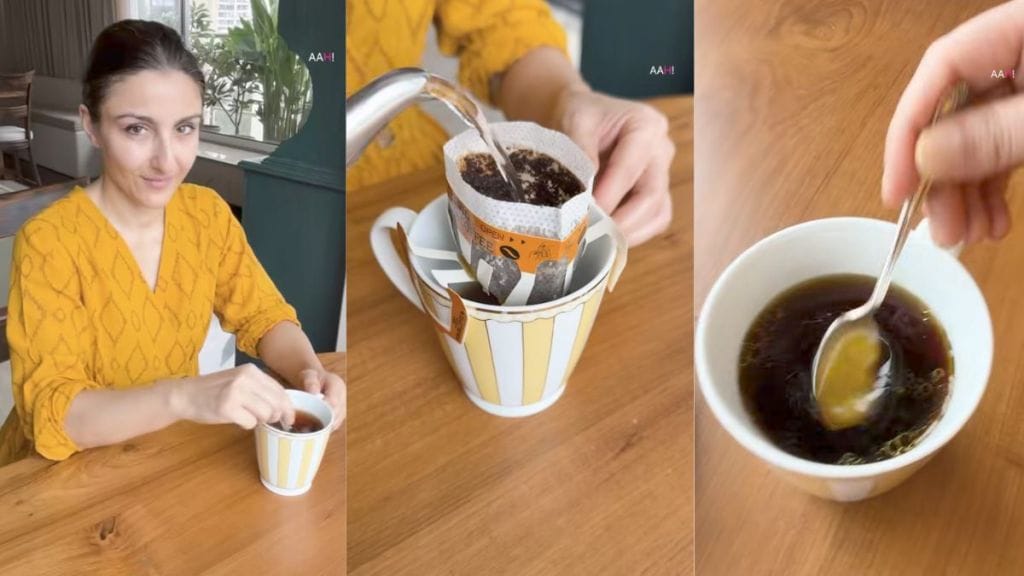Bollywood actress Soha Ali Khan has been sharing about her diet, fitness and food experiments on her Instagram stories and posts. Recently, she tried the trending ghee coffee, a drink that has taken social media by storm. While many Bollywood celebrities swear by it for its energy-boosting and fat-burning benefits, Soha’s approach is a little different. She decided to try it herself and share a balanced perspective, explaining both pros and cons of the trending ghee coffee.
In her Instagram post, Soha admitted, “For the longest time, in the attempt to be healthy, I thought I should avoid ghee in my diet.” However, she recently realised that not all fats are bad, and ghee, long used in Indian kitchens, is one of the good ones. She also mentioned that ghee is being hailed as a “superfood” nowadays.
But the actress was cautious about ghee coffee, which has been trending for some time. “I know, I know I’m late to the bulletproof coffee party, honestly, it’s a miracle I showed up at all! Not every trend is meant for you. Before you put ghee in your coffee, look up the pros and cons and then listen to your body,” she wrote. She listed potential benefits like an energy boost, healthy fats, improved focus, and gut support, but also warned about feeling heavy or triggering acidity. “Bottom line: Let your body decide,” she added.
So who should try ghee coffee and who should avoid it?
Expert’s take on ghee coffee
To understand the health implications of this fat-infused drink, The Financial Express spoke to Dr. Nirdesh Chauhan, Consultant Gastroenterologist at Fortis Faridabad. He explains that ghee coffee is not suitable for everyone, mainly due to its high saturated fat and calorie content. “Individual reactions vary based on overall health, body type, and existing conditions such as high cholesterol, gallbladder issues, or gastric problems,” Dr. Chauhan says.
Each cup of ghee coffee typically contains around 250 calories from just 1–2 tablespoons of ghee. “Since ghee is almost 100 per cent saturated fat, excessive consumption can raise cholesterol and contribute to arterial plaque formation,” the doctor warns.
Who should be cautious
Dr. Chauhan explains those with cardiovascular and metabolic conditions like high cholesterol, heart disease, or high BMI should avoid this drink. “The calorie-dense nature and saturated fats can worsen these conditions,” he explains.
People with digestive disorders, including gallbladder issues, acid reflux, GERD, or IBS with diarrhoea, are also advised to steer clear. “Even though ghee is largely lactose-free, it can trigger digestive discomfort in sensitive individuals,” Dr. Chauhan adds.
Certain health conditions, such as liver disease, diabetes with complications, or post-cholecystectomy patients, may also make ghee coffee unsuitable. And, those on calorie-restricted or low-fat medical diets should avoid it at any cost.
Why some people drink ghee coffee
Despite these risks, many are turning to ghee coffee for specific benefits. People following keto or low-carb diets often consume it to promote ketosis and fat burning. The combination of caffeine and fat is said to provide long-lasting energy without the crash typical of regular coffee. A study published in the Ochsner Journal suggests that coffee can reduce the risk of heart disease, lower blood pressure, and improve cholesterol levels.
Potential benefits of having ghee coffee
Although research on ghee coffee is still limited, some studies point to potential health benefits. Dr. Chauhan says, “Ghee contains butyrate, a short-chain fatty acid that supports gut health and helps reduce inflammation.” Research has shown that butyrate plays a key role in maintaining the intestinal barrier and regulating inflammation in the gut. Ghee is also rich in fat-soluble vitamins such as A, D, E, and K, which aid nutrient absorption and overall health.
A study published in the Journal of Food Science and Technology found that incorporating healthy fats like ghee with beverages can enhance the absorption of these vitamins. Further, ghee’s calcium content may help neutralise the acidity of coffee, making it easier on the stomach. Some preliminary research even suggests that consuming moderate amounts of ghee as part of a balanced diet could support satiety and modest weight management. However, Dr. Chauhan warns that, “The evidence is limited, and the effects are minimal, so ghee coffee should not be seen as a magic solution for weight loss or health.”
How can ghee coffee negatively impact your health?
However, ghee coffee is not risk-free. Dr. Chauhan warns of cardiovascular risks, including increasing LDL cholesterol and triglycerides, arterial plaque formation, and increased heart disease risk in those with pre-existing conditions.
Weight and metabolic concerns are also there when it comes to ghee coffee. “Each cup adds over 250 calories, which can contribute to weight gain if not balanced with overall intake,” he says. Having ghee coffee with carb-heavy meals can impair glucose tolerance and increase the risk of metabolic syndrome.
Ghee coffee can also cause digestive issues for some people, like nausea, bloating, or diarrhoea. Using it as a main source of energy might replace other important nutrients and lead to deficiencies.
Not a one-size-fits-all solution
Dr. Chauhan points out that while ghee coffee may offer benefits for some, it’s not a one-size-fits-all solution. “It can be risky for many people, especially those with health issues or special dietary needs,” he says.
For Soha Ali Khan, trying ghee coffee is a way to understand her body and make informed choices. Her message is simple: not every trend works for everyone, and it’s important to listen to your body. Dr. Chauhan agrees with her, adding that it’s important to know your health, listen to your body, and consult a doctor before making any changes to your diet.


